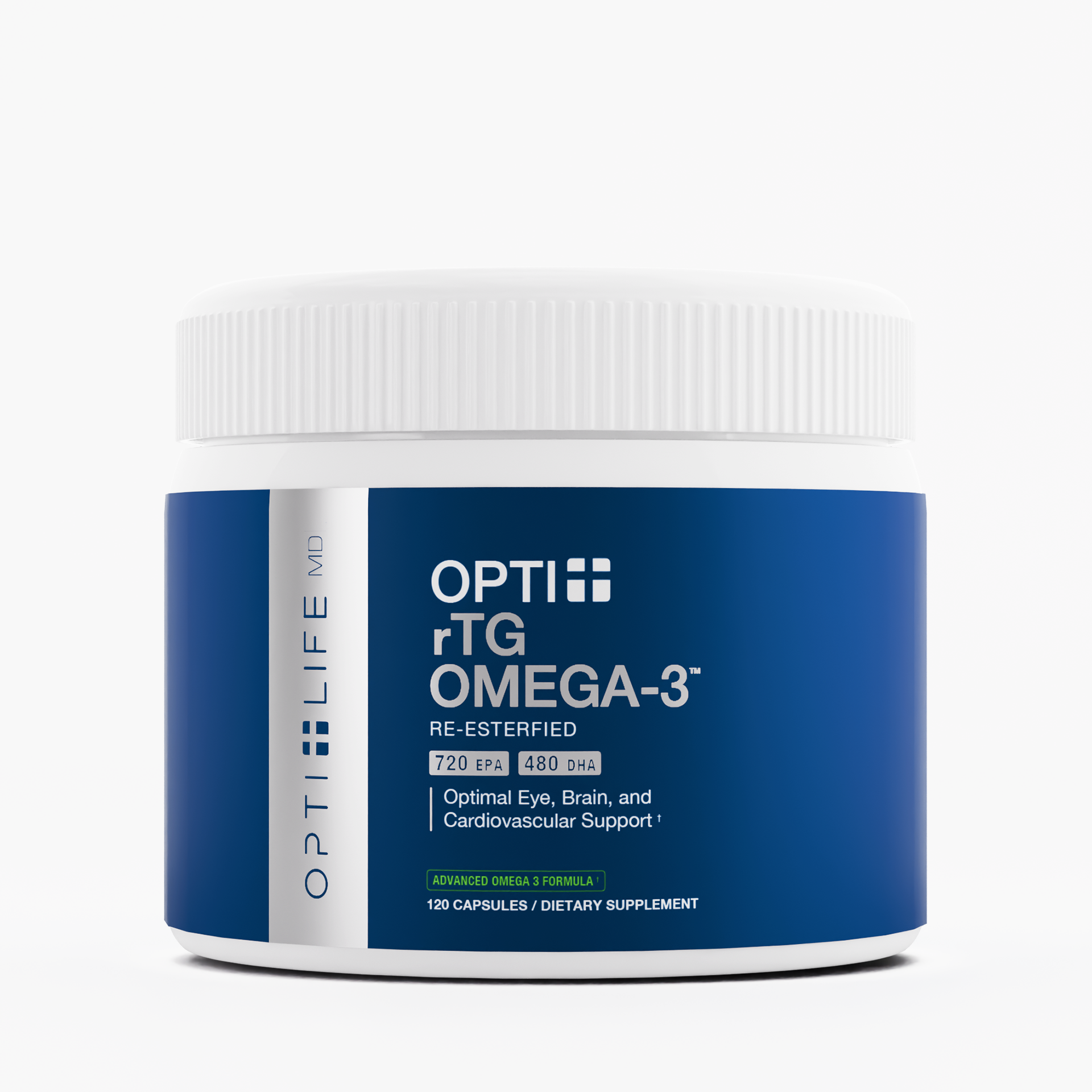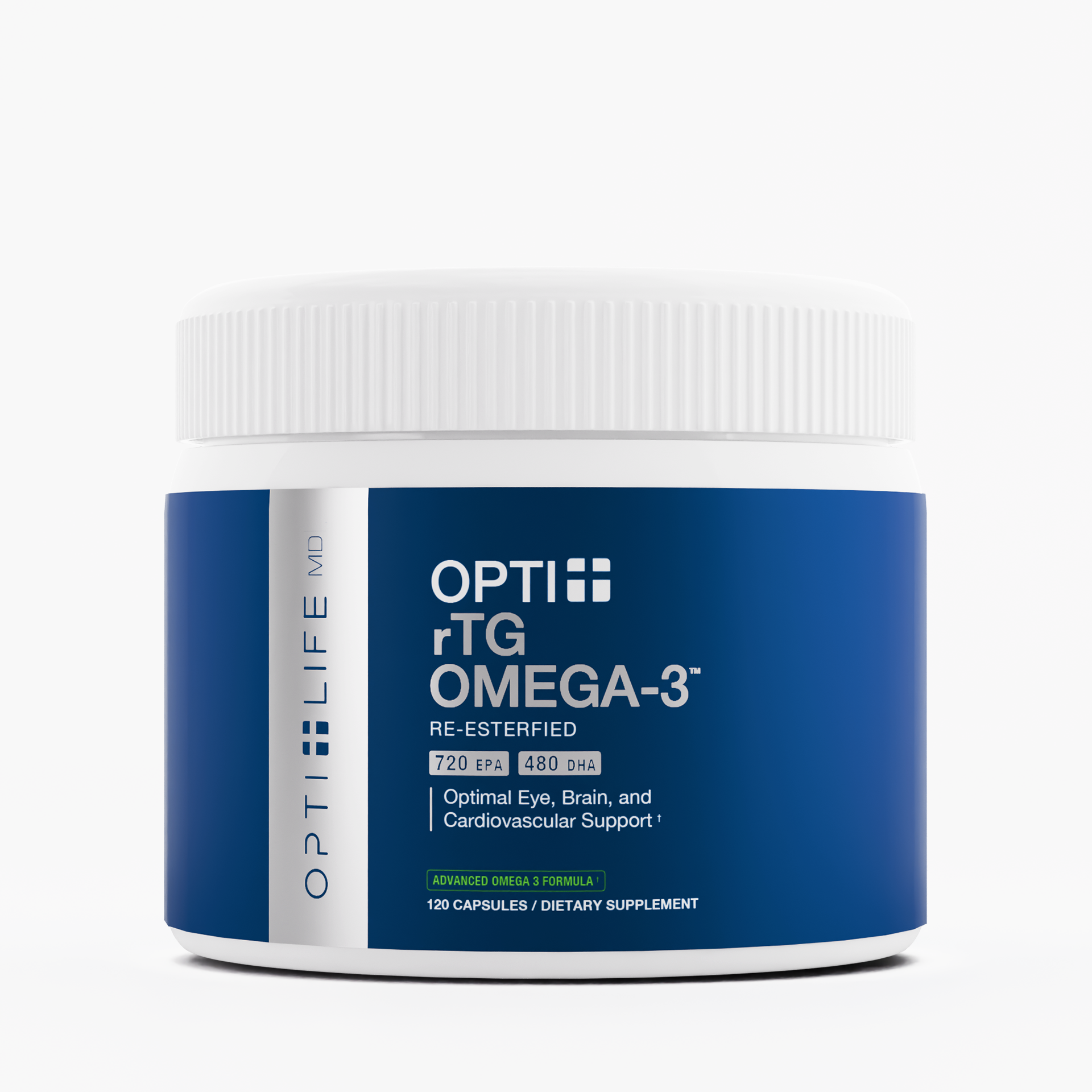
Opti + rTG Omega-3
Advanced Omega-3 Supplement for Vitality & Wellbeing
One-Time Purchase Benefits
- Guaranteed Delivery
- 20% off all orders
- Free Shipping Always
- Prompt VIP Support
- Early Access to Sales
- Exclusive Health Tips from Dr. Gills

No Artificial Preservatives

Non-GMO

Non-Dairy

BPA-Free Container

No Artificial Flavors or Colors

GLUTEN free

Opti+rTG Omega-3™
Opti+ rTG Omega-3™ is expertly formulated to support overall health by harnessing the power of highly bioavailable Omega-3 fatty acids.
This re-esterified form promotes heart health² ⁴, enhances brain function³ ⁸, and supports joint flexibility and comfort⁴.
Its advanced purification process also helps reduce heavy metal content such as mercury⁶, while supporting inflammation balance⁵ and overall well-being.
Dr. Gills recommends patients monitor their Omega-3 index with a healthcare provider and aim for optimal levels around 8%.⁷

Opti+ rTG Omega-3™ is formulated with Re-esterified Triglycerides (rTG), delivering 720mg of EPA and 480mg of DHA per serving for maximum bioavailability and absorption⁹.
This form has been shown to help increase Omega-3 index⁷, support neuron function³, improve memory retention¹¹, and ward off cognitive decline⁸.
It’s also the form Dr. Gills recommends in clinical use for patients with dry eyes⁶ due to its superior uptake and inflammation-modulating effects.
Unlike standard formulations, the rTG structure allows for faster and more complete absorption⁹, ensuring long-term cognitive and systemic benefits.

Optimized Omega-3 Absorption with rTG Technology*



Boost Immune System & Overall Vitality*
Our Omega-3 formula boosts your immune system and overall vitality by delivering EPA and DHA, which support immune cell function and inflammatory regulation⁵ ¹⁰. These nutrients help promote general well-being and keep you active and resilient every day⁵ ¹³, especially when supported by efficient absorption through rTG forms⁹.


Support Heart Health & Reduce Inflammation*
Our Omega-3 formula supports heart health by helping regulate triglyceride levels², improving cholesterol ratios⁴, and promoting vascular function⁶. EPA in its purified, re-esterified form helps reduce exposure to toxins like mercury⁶ while supporting the body’s natural anti-inflammatory pathways⁵ ¹³, promoting a healthier cardiovascular system long-term.

Powerful Ingredients Behind Our rTG Omega-3 Formula


EPA (Eicosapentaenoic Acid)
Heart & Inflammation Defender*
EPA in triglyceride form plays a vital role in maintaining cardiovascular health², supporting cholesterol balance⁴ and helping reduce inflammation throughout the body⁵. Its superior absorption⁹ enhances delivery to tissues, and purification helps reduce toxin exposure⁶. Dr. Gills recommends this form to support circulation, heart function, and inflammatory balance⁶ ⁹ ¹³.


DHA (Docosahexaenoic Acid)
Brain & Cognitive Booster*
DHA is essential for brain structure and function³, supporting the development and maintenance of neural pathways. In its re-esterified triglyceride form, it absorbs more efficiently⁹—delivering faster benefits for memory, focus, and mental clarity¹¹ ⁸. It is clinically supported for long-term cognitive protection⁸ ¹⁴, and Dr. Gills emphasizes its value for patients seeking optimal brain health and Omega-3 status⁷.

See How Opti+rTG Omega-3™ Compares To The Rest

Recommended By TOP Health Experts

"I often recommend re-esterified Omega3 for my patients with dry eye syndrome.
Why re-esterified Omega-3?
Omega-3 in its natural form has an Ester group attached to it. The Ester is replaced with an alcohol in the process to concentrate EPA/DHA.
The process to produce re-esterified Omega3 replaces the Ester group. This allows for better absorption, higher concentration of EPA/DHA, and more stable EPA/DHA. A higher level of Omega-3 will have more of the cognitive and cardiovascular benefits.
A side benefit is a less fishy aftertaste with re-esterified Omega-3. Ideally, everyone should know their Omega3 index.
They should work with their healthcare provider to get their ideal Omega-3 index. Most health individuals aim for 8% Omega-3 index, but that can be different with some individuals.
The Omega-3 index is an indirect measurement of Omega3 concentration. It represents the concentration of EPA/DHA in the red blood cell wall. It may take 3 months to stabilize, so your healthcare provider may slowly adjust your Omega-3 supplement dosage. People who are at risk for bleeding will need to work with their healthcare provider to optimize their Omega-33 level."
Dr. Pit Gills
Endorsed by Nationally Recognized Board-Certified Physician, Pit Gills M.D.

The Doctor's Trusted Brand

No Chemical Junk
OPTI+rTG OMEGA-3™ doesn’t just “contain natural ingredients”- every ingredient is naturally sourced. We don’t use artificial or synthetic substances of any kind.

Clinically EffectiveIngredients & Doeses
Every ingredient and dose (important!) in our supplements is backed by peer-reviewed scientific research demonstrating clear benefits

Naturally Sweetened & Flavored
OPTI+rTG OMEGA-3™ is naturally sweetened and flavored with healthy, plant-based sweeteners and flavors.

No Chemical Junk
If you don’t absolutely love OPTI+rTG OMEGA-3™, you get a prompt and courteous refund. No forms or returns necessary.

Made in USA with Globally Sourced Ingredients
OPTI+rTG OMEGA-3™ is proudly made in America in FDA-inspected facilities in accordance with the Current Good Manufacturing Practice(cGMP) regulations.

“No Return Necessary” Money-Back Guarantee
If you don’t absolutely love OPTI+rTG OMEGA-3™, you get a prompt and courteous refund. No forms or returns necessary.
Our Money-Back Gaurantee

Our 30-Day Money-Back Guarantee is our commitment to your satisfaction. If you’re dissatisfied with the product, simply reach out to us at support@optipluslifemd.com within 30 calendar days of receiving your products to initiate the 30-Day Money-Back Guarantee process.











